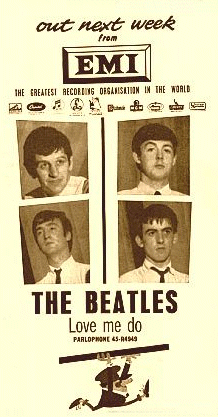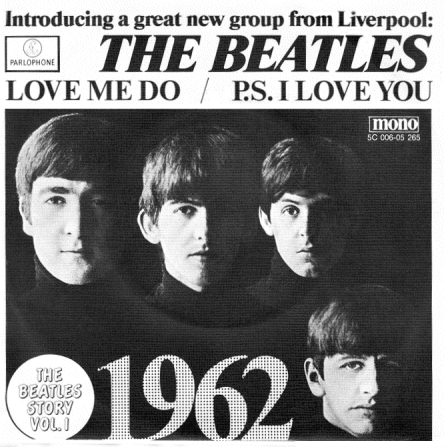Sixties
City presents
a wide-ranging series of
articles on all aspects of the Sixties, penned by the creator of the iconic
60s music paper Mersey
Beat
|
Sixties
City presents
a wide-ranging series of
articles on all aspects of the Sixties, penned by the creator of the iconic
60s music paper Mersey
Beat
|
|||||
|
 |
What
if…..Decca hadn't provided Brian Epstein with the reel-to-reel tapes
of their recording audition? A&R men from London didn't go into the provinces
in search of talent. Artists had to travel down to London. Dick Rowe of
Decca at least had vision. In the Fifties George Martin went to the 2 I's
to see Tommy Steele and decided not to sign him. Dick Rowe went there and
signed Tommy up - and he became Britain's biggest recording star of that
decade. Dick decided to do what A&R men didn't usually do. After the enquiry
from Brian Epstein following The Beatles rejection by EMI and other labels,
Dick sent one of his team up to Liverpool to see the band perform at The
Cavern. As a result they were booked for a recording audition. Much has
been made of Decca's rejection of the group due to Brian stating that Dick
had said "Guitar groups are on the way out". Dick told me he never said
that and I believe him. He had just set up a new team to spearhead a search
for talent and unlike other A&R men he travelled to see bands. Virginia and I were sitting behind him at the Philharmonic Hall when he was chatting with George Harrison who told him about The Rolling Stones, so Dick travelled back to London and signed the Stones. Mike Smith was the Decca A&R man who went to Liverpool to see The Beatles and arranged the audition. He also auditioned Brian Poole & The Tremeloes on the same day. He liked both groups but Dick told him that as he was a newcomer to the team he could sign only one of the groups as he hadn't had any record success up to that date. It was Mike who chose The Tremeloes and I believe it was because they were based closer to Decca's studio than The Beatles, who would have taken several hours to return to the studio in an emergency. So it was logical to sign a group who could rush to the studio within a short time. Dick was gracious enough to present Brian with the reel-to-reel tapes of their audition. If Decca had signed The Beatles their recording manager would have been Mike Smith rather than George Martin and perhaps their recording career might not have fared so well. Mike, who has since passed away, went on to record The Applejacks performing one of the Lennon & McCartney numbers from the audition and he also recorded Pete Best's band, but had no real major successes as an A&R man. What if…Brian Epstein hadn't met Paul Murphy in London? Paul Murphy was a Liverpool singer, one of the first to record at the Philips studio in Kensington, Liverpool, even before The Quarrymen. He was a member of Rory Storm & The Hurricanes for a short time before turning solo. He was signed by Wally Ridley of EMI (who had rejected The Beatles), and was singing in London with The Cyril Stapleton Big Band orchestra at The Lyceum. He went into the bar of the Green Park Hotel in Half Moon Street to see his wife and saw Brian Epstein there at the bar. Brian was upset at the fact that The Beatles had been rejected by every major label, so he had to approach the smaller record companies and showed Paul the reel-to-reel tapes he was taking as an example of the Beatles sound. Paul told him that no A&R man would listen to reel-to-reel tapes; he had to have acetates made. He then took Brian to the HMV Store in Oxford Street where he'd had his own recordings turned into acetates. If Paul hadn't taken him to the HMV Centre that day, The Beatles might never have ended up with a recording contract from EMI's Parlophone label and would possibly never have recorded at all. What if…Brian Epstein had placed The Beatles publishing with EMI's publishing arm? The recording engineer transferring the tapes to acetate was intrigued by the fact that there were original numbers on the tape, unusual in those days for artists to write their own material and he informed his boss Ken Boast who came to see Brian and arranged for him to meet Sid Coleman of Ardmore & Beechwood, whose office was on the top floor of the same building. Coleman listened to the acetates and said that he'd like to publish 'Love of the Loved' and 'Hello Little Girl'. Brian told him he didn't want to sign a publishing deal unless he had a record deal. When asked about EMI, Brian said that he had been rejected by Walter Ridley, Norrie Paramour and Norman Newell and had received a letter from EMI stating the company's rejection of The Beatles. Coleman said there was a fourth A&R man (George Martin hadn't originally been approached about The Beatles because he was on holiday) and he asked Brian if he'd like him to arrange a meeting for him. Sid picked up the phone and the meeting was arranged. However, because he was disappointed with EMI's promotion of 'Love Me Do', Brian refused to sign a publishing contract with them, although they were able to obtain the rights to 'Love Me Do' and 'P.S. I Love You'. George Martin recommended that Brian sign with Dick James, a former Polydor recording artist, who he dealt with regularly. As a result The Beatles were to lose the rights to their songs for good. They managed to recover the rights to the two songs with Ardmore & Beechwood and, if they had signed with them, they might possibly have been able to buy back their publishing catalogue. |
| What
if… Brian Epstein hadn't threatened George Martin? Despite the meeting
Brian had with George, he couldn't get any answer regarding an audition.
Brian's personal assistant recalled that 'Parlophone began to play around
with Brian to the extent that he became frustrated and ended up by threatening
to withdraw all stocks of EMI records from his stores if Martin didn't set
up the audition'. Taylor also recalled: "EMI took them on sufferance because
Brian was one of their top customers. I saw Brian in tears, literally, because
Martin promised to phone back, and day after day went by and George Martin
was never available, always 'in a meeting'. I saw Brian thumping his desk
and in tears because George Martin didn't give The Beatles a recording contract". What if…Ron Richards had become The Beatles' recording manager? George Martin was known as 'the comedy king' because he had recorded a number of comedy records by artists such as Peter Sellers, Bernard Cribbins, The Goons, Charlie Gracie and others. He also recorded popular revues such as 'Flanders & Swann' and 'Beyond the Fringe'. George never touched any groups or rock and roll artists, that was left to Parlophone's other A&R man Ron Richards who recorded the label's pop artists such as Shane Fenton and Paul Gadd (later to become Gary Glitter), so it was Ron who was appointed to record The Beatles for their audition and, presumably, would have been their recording manager if they were signed to the label, as he stated "I used to do most of our rock and roll". At the first session, EMI's Ken Townsend recalls, "I remember George Martin taking a quick look at them (The Beatles) and leaving for tea. During the session, when they played 'Love Me Do', Norman Smith, the first engineer, was impressed. He asked the second engineer to go down to the canteen and bring George Martin to see them". If he hadn't done that, Martin wouldn't have attended the audition, leaving it to Ron Richards, who would presumably have become their recording manager just as Smith became engineer on their future recordings because he was at that audition. What if…The truth about session drummers had been revealed at the time? Because George Martin suggested that he felt Pete Best wasn't suitable for the recording, the tale has persisted down the decades that he simply wasn't good enough. That comment led to the excuse required to sack their drummer. When Pete's mother Mona contacted George Martin about it, he told her: "I never suggested that Pete Best must go. All I said was that for the purposes of The Beatles' first record I would rather use a session man. I never thought that Brian Epstein would let him go. He seemed to be the most saleable commodity as far as looks went. It was a surprise when I learned that they had dropped Pete". It was general for all the recording studios to use session drummers. While Martin had admitted that guitars and vocals were no problem in a studio, he needed a certain sound from drummers in a studio which differed from that of drummers who'd only performed on stage. Andy White, who was booked for their third Abbey Road appearance, had played on several of Parlophone's records. Session drummer Clem Cattini played on 44 chart hits by groups. Other session drummers included Bobby Graham, Ron Bowden, Carlo Little and Jack Peach. They played on records by The Animals, The Kinks, Procol Harum, Herman's Hermits and most of the British groups. If this had been explained, there might have been no excuse to sack Peter Best. The widespread use of session drummers for recording was kept quiet at the time to avoid negative publicity. This occurred when it was revealed that Procol Harum's drummer didn't play on 'A Whiter Shade of Pale' - it generated newspaper headlines! What if…the same criteria had applied to Ringo Starr? Although it was only a mention from Martin that he'd prefer a session drummer which led to Pete's sacking, there had been no other objection. Yet, it was Ringo's performance that actually led to Andy White being booked for the 'Love Me Do' session. George Martin commented, "I didn't rate Ringo very highly. He couldn't do a roll - and still can't - though he's improved a lot since. Andy was the kind of drummer I needed. Ringo was only used to ballrooms. It was obviously best to use someone with experience". Ron Richards was also unhappy with Ringo's performance and said that he lacked drive. Engineer Norman Smith commented, "He didn't have quite enough push" and "I've a feeling that Paul wasn't too happy with Ringo's drumming, and felt it could be better" and an unhappy Paul McCartney had to admit: "Ringo, at that point, was not that steady on time". |
 |
|
Article
Text
UK
web hosting by
|